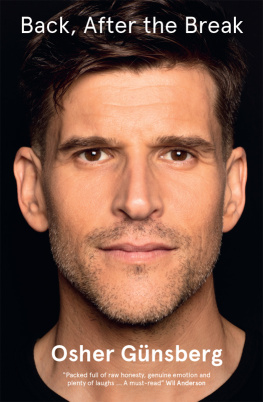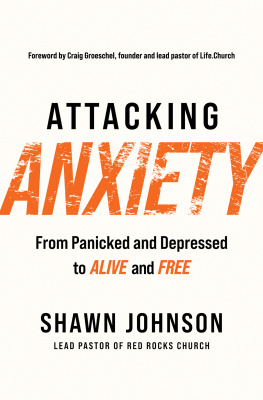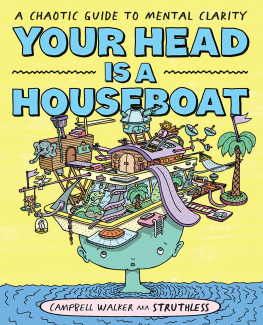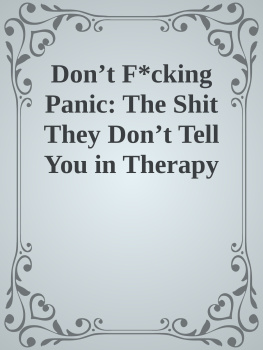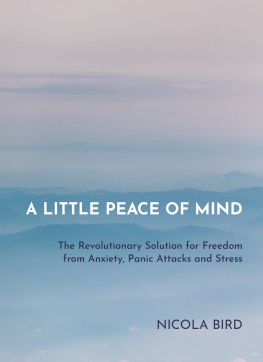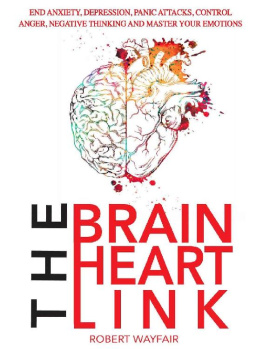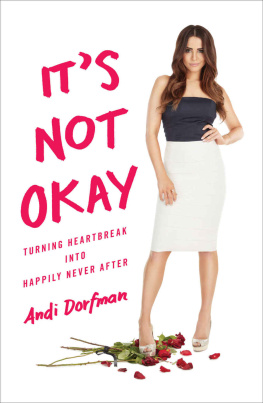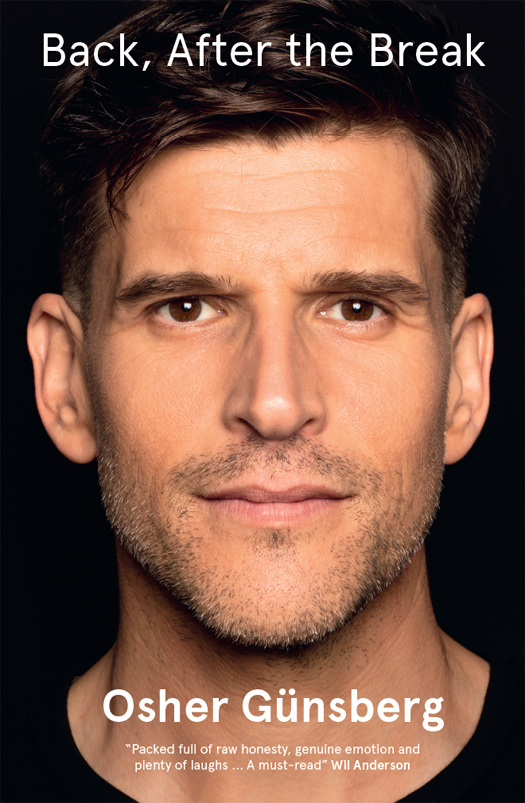contents
Guide
OSHER GNSBERG is one of Australias most recognisable media personalities. His radio and television career spans over two decades, including Channel [v] in the early 2000s, seven seasons co-hosting Australian Idol, and host of The Bachelor Australia, The Bachelorette Australia and Bachelor in Paradise.
The Osher Gnsberg Podcast began in 2013, features over 240 episodes and has thousands of daily listeners all over the world.
Osher lives with his wife, Audrey, and stepdaughter, Georgia, in Sydneys eastern suburbs. He is a cycling enthusiast, a coffee connoisseur and only eats plants.
For Audrey, who helped me believe that it was going to be OK.
For Georgia, who showed me how to experience anothers joy as my own.
For my brothers, the three smartest, wisest, most incredible people I know; for always being there when I needed them the most.
This book deals with mental illness, suicidal ideation and drug use. If you, or a person you know, is in need of crisis or suicide prevention support, call Lifeline on 13 11 14, Kids Helpline on 1800 55 1800, or call 000 in an emergency.
If this book raises any issues for you, you can contact the SANE helpline on 1800 187 263 (weekdays 10am10pm AEST) to talk to a mental health professional, or visit eheadspace.org.au or www.lifeline.org.au/gethelp
H i. Thanks for being here. I used to be known as Andrew, but well get to that. Thanks for deciding that my story was good enough for you to want to part with your hard-earned cash.
In the radio and TV business, we talk about hooking; finding ways of making you watch or listen longer. I suppose I had better hook you by telling you whats in the pages ahead.
Better start with the big stuff then.
In sobriety, Ive learned what rock bottom is. Its where your life has become so unmanageable that you lie there, often in a pile of your own filth, and realise that the only reason youre down there is because of decisions you have made. In the past you may have found yourself in the same place, but you had blamed your partner, your job, your parents, your country anyone but yourself. You reach rock bottom when you have run out of people to blame for your own choices. Its only then that youre able to take responsibility for the decisions that have put you there, and start the long and painful climb out of the muck in a direction youve never gone before a direction that involves healing the hurt youve caused and trying not to repeat the mistakes of the past.
For some people, rock bottom is a crystal clear and defined moment, after which their lives are irrevocably different. I got the bonus plan.
Sure I had a rock bottom with my drinking and using, but that was really just the first bounce along the asphalt as if my life was a ute that was hurtling down the road at 120 kilometres an hour in a school zone, and Id just drunkenly fallen out the back of it. Id spin in the air and bounce painfully again as my first marriage ended, once more as my career wound up in the toilet, and then just when I thought Id come to a skidding halt I flipped and smashed face first into the ground once again as my own mental health became the most dangerous thing in my life, something that threatened to stop my journey permanently.
Because of the job I do, you probably heard or saw me a few times along the way as I was bouncing down to rock bottom. I probably had a big smile, one of three separate names, and I most definitely had a questionable haircut. But I can tell you that while you might have been familiar with the face that you saw, what was really going on behind those excited eyes and that TV smile was something far darker than would have ever been allowed on prime time.
But here it is. The whole story.
S ome time around 1970, Michael Gnsberg walked alone through the residents hall at Stoke-on-Trent hospital during a regular Friday night party. It was the end of a long week and like most other doctors he was enjoying a few English-temperature beers to take the edge off the stresses of being a junior doctor at a busy hospital.
He joined a few other resident doctors in animated discussion, and thats when he first laid eyes on a petite woman curled up on an armchair, her teeny miniskirt doing a terrible job of hiding her slender legs. A resident doctor herself, she looked up at him and saw a tall, dark and handsome stranger. Thats how my parents met.
My mother was born Birute Magdalena Mikuzis in Kaunas, Lithuania. World War II saw her and her family flee their native land when the Russians took the country back from the occupying German army in 1944. I dont know what you were doing at four years old, but my mum and her family were fleeing with the retreating Germans; whatever the enemy were doing was less horrible than whatever the Soviets were promising.
Mum had lived for three years under German occupation a dark time in Lithuanias history indeed. It took her years to tell us about it. Largely untouched because of their Catholic faith, Mums family had a front-row seat to the horrors inflicted on the Jews of their community, largely by members of the non-Jewish community. Its estimated that some 190,000 Jews were murdered during the German occupation of Lithuania. While many Lithuanians collaborated with the Nazis in destroying the Lithuanian Jewish population, Im proud to say that my mothers family resisted the injustices wherever they could.
Both my Lithuanian grandparents were doctors, and the main hospital in Kaunas where they worked was right on the town square. One day, some local Nazi thugs were sadistically whipping a man in that very square. They had tied him to a pole and were flaying him for all the town to see. Infuriated by his wails of agony, my grandmother Aldona Mikuzis walked out the front door of the hospital and marched across the square, shouting the whole way at the Nazis. Not used to being challenged, let alone by a woman, they stopped in their tracks while she chastised them. She told them that she was sick of patching up their victims every day once they had had their fun, and told them to find something better to do. Amazingly, they let her go.
My grandfather Jonas Mikuzis was a prominent figure in town. A former lieutenant in the cavalry, he headed up the obstetrics and gynaecology department at the hospital. He and my grandmother owned a farm a little way out of town; it backed onto a train line between two stations. My grandmother had arranged with the train conductor to stop the train at the back fence, allowing her to get off and save travelling all the way back from the next station.
Under the guise of hiring young Jewish girls to help around the farm, my grandmother would arrange for them to come with her on the train. Perhaps the fact that she was putting Jews to work allowed her to get the kids past the guards. When the train stopped at the farms back fence there were no such police or guards, as there would have been at the station. My babyt was able to smuggle the girls off the train and very quickly hand them over to an underground organisation that helped them escape the country altogether.
My babyt did all of this without my grandfather knowing. Once he found out he was terrified of retribution; the Nazis had executed many Lithuanians who had tried to help the Jews. By the time he had convinced my grandmother to stop, she had helped at least six young women escape certain death. Not every person could be Oscar Schindler, but its important to know that all across Europe families did what they could to help their friends and neighbours.
Next page
